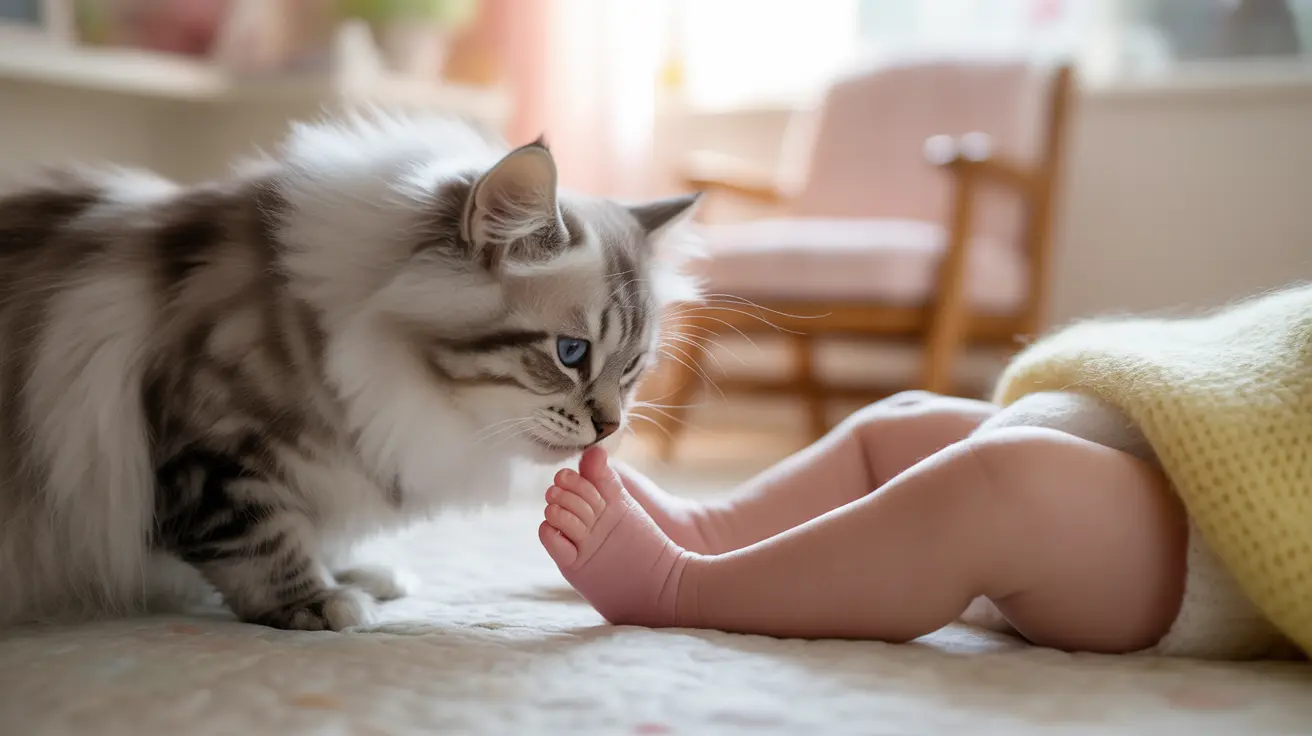When a new baby joins a household with cats, many parents wonder about their feline friend's perception and reaction to this tiny human addition. Understanding what cats think of babies is crucial for ensuring harmonious coexistence and safety for both your pet and your infant.
While cats don't intellectually comprehend that babies are human infants, they do recognize them as unique beings through their sophisticated sensory abilities. Let's explore how cats perceive and interact with babies, and what you can do to ensure a peaceful household.
How Cats Perceive Human Babies
Cats primarily rely on their acute senses to understand and interpret their environment, including new family members like babies. Their perception is based on three main sensory inputs:
Scent Recognition
Cats have an extraordinary sense of smell, which they use to investigate babies. They detect unique scents associated with infants, including:
- Baby products (lotions, powders, diapers)
- Milk and formula
- Natural baby scents
- Changes in household hormone levels
Sound Detection
Babies create distinct sounds that cats find intriguing or sometimes concerning:
- High-pitched crying
- Cooing and babbling
- Movement sounds (rattles, toys)
- Parent's altered speech patterns when addressing the baby
Visual and Movement Cues
Cats are particularly attuned to movement, and babies provide plenty of novel motion to observe:
- Random arm and leg movements
- Crawling attempts
- Mobile and toy movements
- Parent's new caring behaviors
Common Cat Reactions to Babies
Cats typically display various behaviors when encountering babies:
Positive Reactions
- Gentle investigation and sniffing
- Protective behavior
- Calm observation
- Careful approach and retreat
Cautious or Stressed Reactions
- Hiding or avoiding baby areas
- Changes in eating or sleeping patterns
- Increased vocalization
- Marking territory
Safety Guidelines for Cats and Babies
Ensuring safety is paramount when cats and babies share a home. Consider these essential precautions:
Physical Safety Measures
- Install baby gates
- Use crib nets
- Keep nursery door closed
- Create cat-free zones
Health Considerations
- Regular vet check-ups for cats
- Maintain proper hygiene
- Monitor for signs of stress in both cat and baby
- Keep litter boxes away from baby areas
Helping Cats Adjust to New Babies
A smooth transition requires careful planning and patience:
Before Baby Arrives
- Gradually introduce baby items
- Create new safe spaces for your cat
- Maintain regular feeding schedules
- Play recordings of baby sounds
After Baby's Arrival
- Continue giving attention to your cat
- Reward calm behavior around the baby
- Never force interactions
- Maintain consistent routines
Frequently Asked Questions
How do cats perceive and recognize human babies?
Cats recognize babies through their distinct scents, sounds, and movements rather than understanding them as human infants. They use their keen senses to investigate and assess this new presence in their environment.
What are common cat behaviors and reactions when a new baby arrives?
Common reactions include curiosity, protective behavior, avoidance, or stress-related responses. Each cat's personality and previous experiences influence their specific reaction to a new baby.
How can I safely introduce my cat to a newborn baby?
Introduce gradually, supervise all interactions, reward positive behavior, and maintain your cat's routine. Never force interactions and ensure your cat has safe spaces to retreat.
What safety concerns should I keep in mind with cats and babies in the same home?
Key concerns include preventing unsupervised access to the baby's sleeping area, maintaining proper hygiene, and monitoring for signs of stress or aggression in your cat.
Why might my cat show stress or jealousy after a baby is born, and how can I help them adjust?
Cats may feel stressed due to changes in routine, attention, and environment. Help them adjust by maintaining consistent schedules, providing attention, and creating safe spaces away from the baby.
Conclusion
While cats may not understand exactly what babies are, they can develop positive relationships with infants when properly introduced and supervised. Success lies in careful preparation, consistent routines, and respecting both your cat's and baby's needs for safety and comfort.
Remember that every cat is unique, and their reaction to a new baby will vary based on their personality and experiences. With patience, understanding, and proper management, cats and babies can safely coexist and even develop special bonds as the child grows.






